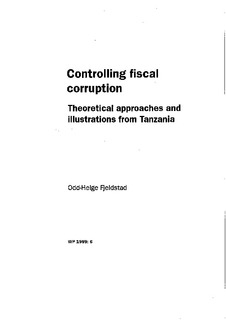Controlling fiscal corruption. Theoretical approaches and illustrations from Tanzania
Working paper
Permanent lenke
http://hdl.handle.net/11250/2435747Utgivelsesdato
1999Metadata
Vis full innførselSamlinger
- Bora-import [434]
Sammendrag
The primary concern of this paper is to discuss the role of various economic factors in explaining corruption in tax administration. The emphasis is on how the incentive structure of the tax system affects the decisions of tax collectors to engage in fraudulent behaviour. It is argued that divergent motivations of the individuals involved and imperfect information lie at the core of understanding these problems. Divergent motivations open up the door to strategic behaviour where agents are pursuing their personal goals, and not the success of the institution. This is a particular problem when information is asymmetric across individuals. Such informational asymmetries may be significant in the tax administration. The paper starts with a set of research questions based on empirical observations from local governments in Tanzania, and examines the fundamental ideas, basic assumptions and limitations of possible theoretical approaches to answering these questions.
Utgiver
Chr. Michelsen InstituteSerie
CMI Working paperWP 1999: 6
